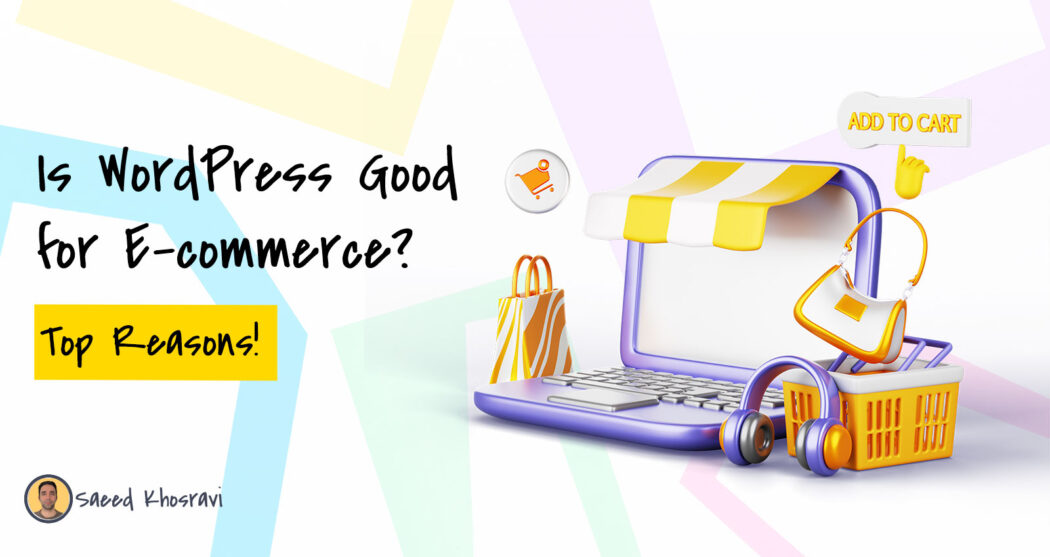Yes, WordPress is a good option for creating an e-commerce website. It offers open-source, free software with many plugin options that add e-commerce functionality. You can also choose from various visually appealing templates explicitly designed for selling products online. Most importantly, WordPress s SEO friendly and helps you get traffic.
When you are building an e-commerce website, you need to choose the right platform, and this is crucial. WordPress is the most popular option that often comes up.
Table of Contents
WordPress is primarily known as a blogging platform. It has evolved over the years and is now widely used for various types of websites, including e-commerce.
But is WordPress really a good choice for e-commerce businesses? Today I will try to find the answer and explore the pros and cons of using WordPress for your online store.
Is WordPress Good for E-commerce?
Before jumping into the advantages and disadvantages of using WordPress for e-commerce, let’s answer the question: Is WordPress good for e-commerce? The answer is yes!
You should have certain considerations to keep in mind; overall, WordPress can be a fantastic choice for your online business.

Now, let’s take a closer look at some of the key benefits:
Pros Of Using WordPress For E-commerce Businesses
Pros of WordPress
1. Open Source Free Software
The biggest advantage of using WordPress for your e-commerce website is that it is open-source software, meaning it is completely free.
If you have a small business or startup with a limited budget, this can be especially beneficial for you. When you don’t have to invest in expensive software licenses, you can allocate those funds toward other aspects of your business, such as marketing or inventory.
2. It Offers Plugins to Add Ecommerce Functionality
In WordPress, you will get a vast library of plugins that you can install to enhance your website’s functionality.

Several popular plugins are available for e-commerce, such as WooCommerce and Easy Digital Downloads. These plugins provide excellent features and tools that are specifically designed for selling products online.
With these plugins, you can easily manage inventory, set up payment gateways, manage shipping options, and many more.
3. It Offers Dozens of Template Options
There are thousands of pre-designed themes available on the market today. With WordPress, you can easily find a visually appealing template that suits your brand identity.
Many of these themes are specifically built and designed for e-commerce. These themes offer features like product galleries, shopping cart integration, and customizable layouts.
Whether you’re selling clothing, electronics, or handmade crafts, you can find a WordPress theme that suits your needs.
4. It’s SEO-friendly
We all know that search engine optimization (SEO) is crucial for driving organic traffic to an e-commerce website. Fortunately, WordPress is inherently SEO-friendly!
It can provide clean code and easily customizable meta tags, which makes it easier for search engines to crawl and index your site. Isn’t that helpful?
You can also access numerous SEO plugins that can help optimize your content further. They can suggest keywords, generate XML sitemaps, and improve site speed.
5. Easy Product Customization
One of the strengths of WordPress is its flexibility in terms of customization. With the right tools and plugins, you can easily make your products appealing to your customers.
You can also add product images and descriptions to implement custom fields or product variations. Visitors can easily navigate between your products, and as WordPress customization option allows you to create a user-friendly interface.
6. Supports a Range of Payment Gateways
You will need a variety of payment gateways to cater to different customer preferences. From WordPress, you can accept online payments from several payment gateways.
You can integrate with popular payment gateways like PayPal, Stripe, Authorize.net, etc. This gives you the flexibility to choose the best option for your business. At the same time, it ensures a smooth checkout process for your customers.
Cons Of Using WordPress For E-commerce
So far, I have discussed several advantages of using WordPress for e-commerce businesses; you also need to consider some potential drawbacks as well. Let’s see what they are:
1. It’s Not Built For E-commerce Specifically
Although you may find many available plugins to add e-commerce functionality to a WordPress website, you will be surprised to know that WordPress was designed as a blogging platform!
This means you may miss some of the advanced features commonly found in dedicated e-commerce platforms. You might have to perform some additional customization with plugins.
This might be fine for you if your e-commerce requirements are basic, but if you have plans to do business that has complex needs might find it limiting.
2. Some Plugins Don’t Play Well Together
Many plugins are available in the WordPress library, but you need to be cautious when installing multiple plugins from different developers.
Sometimes, certain plugins can conflict with one another or cause compatibility issues that may affect your website’s performance.
So, you must thoroughly research and choose reputable plugins and regularly update them to minimize conflict issues.
WordPress Alternatives for eCommerce Business
While WordPress can be a suitable option for many businesses, it’s important to explore alternative platforms to determine the best fit for your specific needs. Here are some popular ecommerce platforms worth considering:
1. Shopify
Shopify is a leading ecommerce platform known for its user-friendly interface and comprehensive features. It offers a range of customizable templates, secure hosting, integrated payment gateways, and built-in SEO tools.
Shopify simplifies the process of setting up and managing an online store, making it an attractive option for businesses of all sizes.
2. Wix eCommerce
Wix is a versatile website builder that also offers ecommerce functionality. It provides a drag-and-drop interface, a wide range of customizable templates, and built-in ecommerce features.
Wix eCommerce allows you to easily create and manage your online store, accept payments, and track orders.
3. BigCommerce
BigCommerce is a robust ecommerce platform designed for businesses looking for scalability and advanced features. It offers powerful built-in tools for managing inventory, processing payments, and optimizing your online store for search engines.
BigCommerce provides a comprehensive solution for businesses aiming to grow and expand their online presence.
4. Squarespace
Squarespace is a popular website builder known for its sleek and modern designs. While it may not offer as many advanced ecommerce features as some of the other platforms, Squarespace provides a user-friendly interface, beautiful templates, and essential ecommerce functionality. It’s a suitable option for businesses that prioritize aesthetics and simplicity.
Conclusion
While there are pros and cons to using WordPress for e-commerce websites, it’s still a solid option for many online businesses.
Due to the open-source nature of WordPress, many small businesses could save their costing. They can still use several plugins and themes tailored toward e-commerce functionality.
However, it would help if you also considered the limitations as it is a non-dedicated e-commerce platform. Just calculate your needs and weigh this consideration, and you can make an informed decision about whether WordPress is the right choice for your e-commerce venture.
